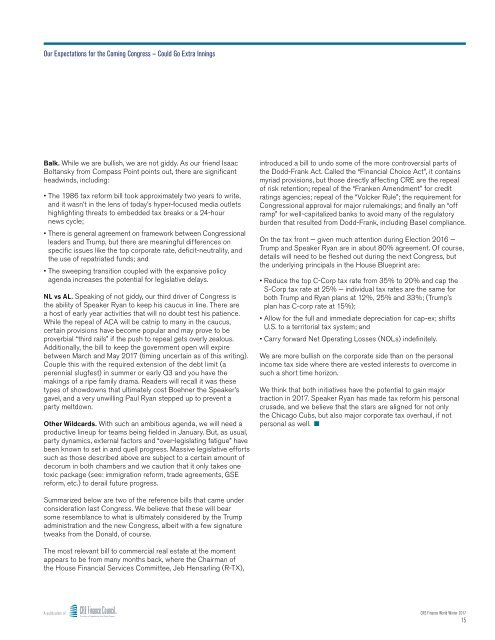CRE FinanCE W Rld
CREFW-Winter2017
CREFW-Winter2017
Create successful ePaper yourself
Turn your PDF publications into a flip-book with our unique Google optimized e-Paper software.
Our Expectations for the Coming Congress — Could Go Extra Innings<br />
Balk. While we are bullish, we are not giddy. As our friend Isaac<br />
Boltansky from Compass Point points out, there are significant<br />
headwinds, including:<br />
• The 1986 tax reform bill took approximately two years to write,<br />
and it wasn’t in the lens of today’s hyper-focused media outlets<br />
highlighting threats to embedded tax breaks or a 24-hour<br />
news cycle;<br />
• There is general agreement on framework between Congressional<br />
leaders and Trump, but there are meaningful differences on<br />
specific issues like the top corporate rate, deficit-neutrality, and<br />
the use of repatriated funds; and<br />
• The sweeping transition coupled with the expansive policy<br />
agenda increases the potential for legislative delays.<br />
NL vs AL. Speaking of not giddy, our third driver of Congress is<br />
the ability of Speaker Ryan to keep his caucus in line. There are<br />
a host of early year activities that will no doubt test his patience.<br />
While the repeal of ACA will be catnip to many in the caucus,<br />
certain provisions have become popular and may prove to be<br />
proverbial “third rails” if the push to repeal gets overly zealous.<br />
Additionally, the bill to keep the government open will expire<br />
between March and May 2017 (timing uncertain as of this writing).<br />
Couple this with the required extension of the debt limit (a<br />
perennial slugfest) in summer or early Q3 and you have the<br />
makings of a ripe family drama. Readers will recall it was these<br />
types of showdowns that ultimately cost Boehner the Speaker’s<br />
gavel, and a very unwilling Paul Ryan stepped up to prevent a<br />
party meltdown.<br />
Other Wildcards. With such an ambitious agenda, we will need a<br />
productive lineup for teams being fielded in January. But, as usual,<br />
party dynamics, external factors and “over-legislating fatigue” have<br />
been known to set in and quell progress. Massive legislative efforts<br />
such as those described above are subject to a certain amount of<br />
decorum in both chambers and we caution that it only takes one<br />
toxic package (see: immigration reform, trade agreements, GSE<br />
reform, etc.) to derail future progress.<br />
introduced a bill to undo some of the more controversial parts of<br />
the Dodd-Frank Act. Called the “Financial Choice Act”, it contains<br />
myriad provisions, but those directly affecting <strong>CRE</strong> are the repeal<br />
of risk retention; repeal of the “Franken Amendment” for credit<br />
ratings agencies; repeal of the “Volcker Rule”; the requirement for<br />
Congressional approval for major rulemakings; and finally an “off<br />
ramp” for well-capitalized banks to avoid many of the regulatory<br />
burden that resulted from Dodd-Frank, including Basel compliance.<br />
On the tax front — given much attention during Election 2016 —<br />
Trump and Speaker Ryan are in about 80% agreement. Of course,<br />
details will need to be fleshed out during the next Congress, but<br />
the underlying principals in the House Blueprint are:<br />
• Reduce the top C-Corp tax rate from 35% to 20% and cap the<br />
S-Corp tax rate at 25% — individual tax rates are the same for<br />
both Trump and Ryan plans at 12%, 25% and 33%; (Trump’s<br />
plan has C-corp rate at 15%);<br />
• Allow for the full and immediate depreciation for cap-ex; shifts<br />
U.S. to a territorial tax system; and<br />
• Carry forward Net Operating Losses (NOLs) indefinitely.<br />
We are more bullish on the corporate side than on the personal<br />
income tax side where there are vested interests to overcome in<br />
such a short time horizon.<br />
We think that both initiatives have the potential to gain major<br />
traction in 2017. Speaker Ryan has made tax reform his personal<br />
crusade, and we believe that the stars are aligned for not only<br />
the Chicago Cubs, but also major corporate tax overhaul, if not<br />
personal as well.<br />
Summarized below are two of the reference bills that came under<br />
consideration last Congress. We believe that these will bear<br />
some resemblance to what is ultimately considered by the Trump<br />
administration and the new Congress, albeit with a few signature<br />
tweaks from the Donald, of course.<br />
The most relevant bill to commercial real estate at the moment<br />
appears to be from many months back, where the Chairman of<br />
the House Financial Services Committee, Jeb Hensarling (R-TX),<br />
A publication of <strong>CRE</strong> Finance World Winter 2017<br />
15


